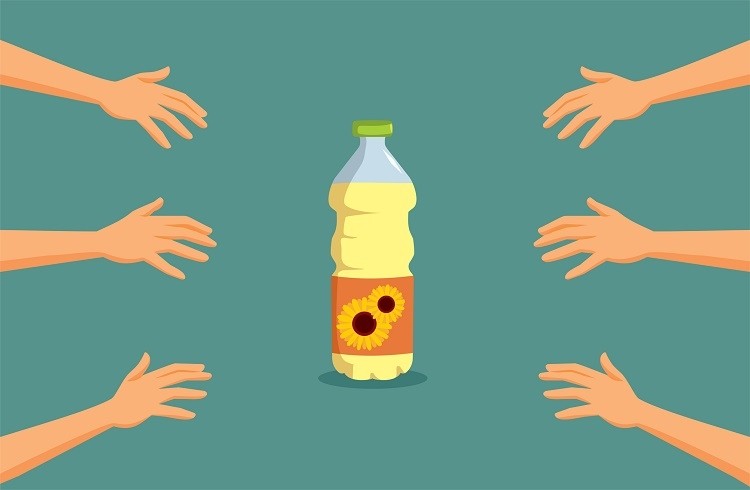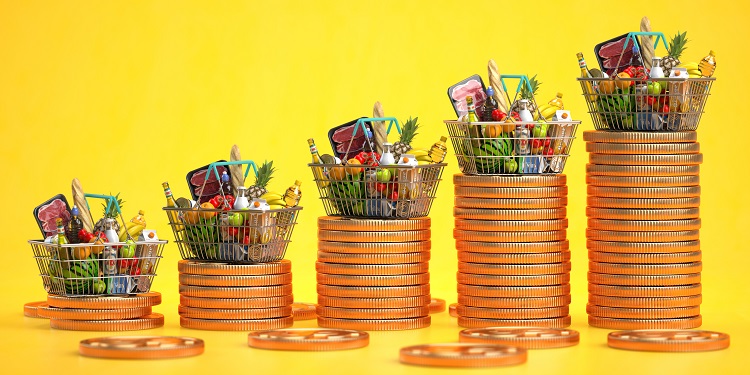In a few days, Russia and Ukraine will be at war for four months.
The impact of the conflict on the food industry in Europe is far-reaching: from commodity shortages to forced product formulation and price hikes.
The food retail industry has experienced these challenges and more. Situated both as the “end of the food chain”, while being “consumer-facing”, this means that retail must manage crises from several angles, suggested Miriam Schneider, director of European affairs at the Federal Association of German Grocery Retailers (BVLH).
For Schneider and members of the trade association, the biggest challenge is energy.
“Retailers are part of the critical infrastructure and being at the end of the chain facing the consumer, they are affected in a three-dimensional way by the increase in energy prices”, Schneider told delegates at the European Food Forum (EFF) event last month.
In what ways exactly is the energy crisis impacting food distribution? And what are the other main concerns of the sector?
Energy crisis: a triple whammy
“First and foremost, I think energy is the most important factor,” explained Schneider at the EFF event.
Energy prices were already on the rise before Russia invaded Ukraine in February this year. But as Russia is a major supplier of oil, gas and coal, sanctions imposed on the country by the EU limit trade between the two.
Reduced supply means higher energy prices for retailers, their suppliers and, of course, consumers. “On the one hand, suppliers are factoring in the increase in energy prices, which means that they are already considerably more expensive at the purchase stage.
“And then retail is one of the most energy-intensive sectors, in terms of consumption. They have cooling costs and costs for their storage warehouses,” explains Schneider.
It has been well reported that shoppers are also feeling the pinch. “Inflation and rising energy costs also have an impact on consumers: on their purchasing power and moderation. We already notice [a change in behaviour]especially in the long feed sector.
This triple whammy would no doubt be exacerbated by cutting off Russia’s gas supply, with no immediate replacement.
“A gas embargo must be seriously considered from our point of view”, adds Schneider of BVLH.
Shortage of raw materials: from wheat to sunflower oil
Ukraine is a major producer of sunflower, corn, soybeans, wheat and barley. Considered the “breadbasket” of Europe, more than 70% of the country’s land is devoted to agricultural production.
Of all the crops that Ukraine grows, it is best known for the production of sunflower seeds. According to Statista, in the 2021/2022 crop year, Ukraine had the highest sunflower seed production volume of any country in the world.
Disruptions to Ukraine’s export capacities following the Russian invasion mean the world is now in short supply. Consumers will probably already have noticed a shortage of sunflower cooking oil on the shelf.
It also creates a challenge for food formulators, as some have been forced to substitute the ingredient with alternative vegetable oils. The most common substitutes so far seem to be palm oil and coconut oil.
For retailers, this concerns their own-brand products. But of course, the concerns are the same for branded alternatives, including ensuring that food ingredients and nutrition labels reflect the contents of their product.
“There is a great need for flexibility in terms of labeling rules”, Schneider pointed out. “We are very grateful for all the efforts the Commission has undertaken, as well as our own government in Germany, to encourage supervisors to take a flexible approach.”
For BVLH, it is imperative that the sector remains “vigilant” in protecting the European internal market. “We need a harmonized approach [to labelling]or alternatively, if that is not feasible, a clear vote for a mutual recognition approach,” she told delegates at the event.
The EU affairs expert revealed that there have been situations where “fully legally labelled” Belgian products have not been accepted in the Netherlands due to a different labeling approach.
“The internal market must be kept at a high level and we must do everything [we can] to avoid such obstacles.
“Of course, no compromises should be made when it comes to food safety, and allergens should be labelled.”
More storage…
As countries move towards a post-COVID “new normal”, increasingly reversing coronavirus-related restrictions, some consumption habits are dying hard.
The act of stockpiling has seen a resurgence across Europe. Where, at the start of the pandemic, evidence was seen in empty shelves – notably where toilet paper and canned goods were once stored – across the block.
However, since the early days of the Ukraine-Russia conflict, consumers have become more concerned about the availability of wheat products. Ukraine was, after all, the world’s sixth largest wheat exporter. Last year, the country produced about 33 million tons, of which it exported about 20 million tons.
“Very often, gaps have been created on the shelf by storage behavior”, Schneider explained, suggesting that retailers have been unable to meet demand for certain products.
“It’s just not predictable for a household to buy 10 packets of flour at a time. This means planning needs to be adapted and supply chains…adjusted. It’s a challenge for retail companies, but I think they’ve done pretty well so far.
Schneider urged the delegates, made up of food industry players and MEPs, to get the message across that storage is not necessary.
“There is no need to stockpile, as it adds an extra layer of tension to supply chains, which is unrelated to any development of the war.”
“We need common and harmonized solutions”
Logistics is another challenging factor for retailers, who currently face the same problems as food producers: packaging materials and raw materials are “massively” more expensive and delivery “often delayed”.
Additionally, retailers are facing staffing shortages and continue to experience stock-outs due to pandemic hangovers. On the global stage, the current container congestion in Shanghai does not solve the problem, Schneider continued.
“And many Ukrainian truckers are now soldiers, which of course adds to the tensions that retailers face.”

How to solve all these problems? BVLH’s Schneider suggested that stakeholders aim for “joint” solutions.
“We need common and harmonized means to deal with it”, we have been told. “We must maintain the internal market and the free movement of goods. We must prevent protectionism and speculation [and allow for] the reorganization of supply chains.
And all of this must be done as part of the Farm to Fork strategy, Schneider stressed.
“This should not mean that we abandon the farm-to-fork strategy or the goals of transforming our large cultural and food production system, in terms of preparing for the challenges we have in the climate crisis. I want to stress this point very strongly.

